#cover story interview
Explore tagged Tumblr posts
Text
#photography#photography blog#photo blog#photoblog#cover story#cover story interview#photographer interview#celebrity photographer interview#photography tips#q&a with a celebrity photographer#photography quotes#celebrity photographers#photographers#cover story article#tbt#tbt article#alina oswald writing#hiv#aids
4 notes
·
View notes
Text

PAGLUIB
way back in like. march?? I took a stab at writing some kind of kabitserye type of story but it was a mess: it kept veering off into murder mystery drama territory because I was reading a lot of murder mystery novels around then and it Wasn't Good because I hadn't tried writing mysteries, let alone murder mysteries, before lmao
I did write a handful of short mystery stories since then, so next year I might take a stab at this idea again now that I'm no longer jumping head first into a genre pool I don't know how to swim in :)
#now for the part where i have to fight off the impulse to write in some b movie horror elements because ive been thinking about#reanimator a lot lately. ehghghh. thank god for the editing process. to wrangle my thoughts into a linear state of creating#anyway i read an article. interview? on the popularity of infidelity dramas in the philippines and it was poetry to me#and i also enjoy the really intense social melodrama in lino brocka's films. specifically the appearance of morality to cover up/justify#ugly behavior. or like. man i'm tired. whatever was going on in murder by tsismis. that's the thing. someday i'll get more into it#and post excerpts from the actual analysis of the film that actually explains the dynamic im talking around here#komiks tag#original tag#also there's some. vague lingering thought about ikaw lamang in here. not in a way that matters#but in a 'the first episode that i saw was not the first episode of the drama itself and it made me go. oh everyone has rotten vibes'#which is not. well. if you saw ikaw lamang then you know the characters. this is not the takeaway from the show. HOWEVER#i did invent a whole different show in my head between that and when the next episode aired. so.#fake ikaw lamang. ikaw lamang if it wasn't even remotely like ikaw lamang. on the topic of ikaw lamang here's a cringe story for you#still following along. BEFORE i had watched the show. i saw a notebook with franco on it but i didn't recognize the character#i just saw jake in a suit and went oh! cool! i will now Buy This!#anyway i still have the notebook lmao
183 notes
·
View notes
Text
transcript:
JF: I think we felt pretty broke. we were doing shows for, like, $200 a night - was basically, like, that was our g- those were our guarantees.
JL: yeah, it was the moment where - I should say, we got.. the most money we'd ever gotten was a- was a publishing deal-
JF: - yeah.
JL: - from Warner/Chappell. and, I then had to acknowledge that I hadn't paid taxes in 7 years [hushed crowd murmuring], and the entire amount of the check was handed over [laughter and pained murmuring] to the Internal Revenue Service.
JF: and that's how we became republicans(!) [JL & loud crowd laughter]
#clip for those who haven't heard the short tax story yet. teehee.#guy who waited to phone up his boiler insurance after the flood damage dried out because his plan didn't cover that to go#''uhh yeah it broke we don't know why!''#tmbg#they might be giants#john linnell#john flansburgh#2020s#interviews#videos
47 notes
·
View notes
Text
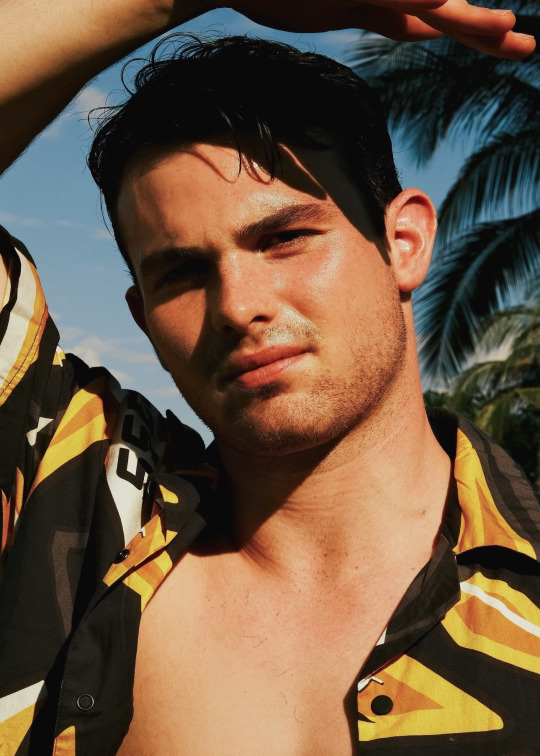
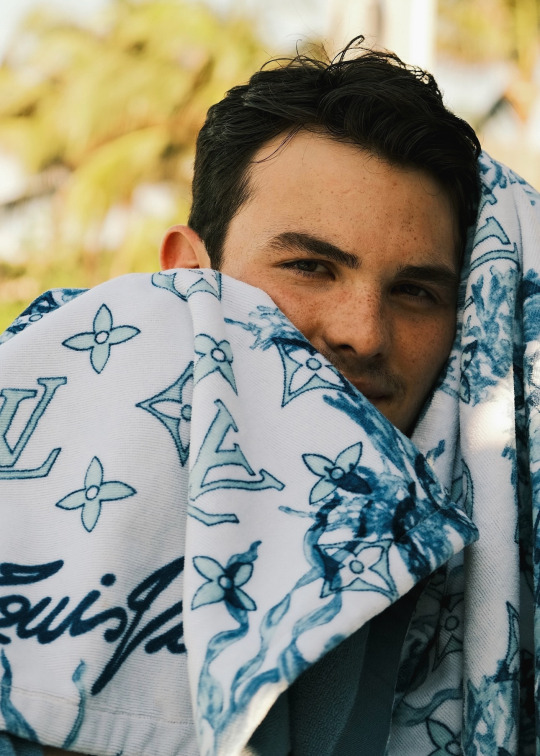

pato o'ward for q8 magazine | january 2024
#he’s the cover star for a magazine but there’s no interview 🤔#just one quote#lol weirdddd#pato o'ward#indycar#from the photographer’s ig stories a few days ago#@aragonsbook#*
179 notes
·
View notes
Text
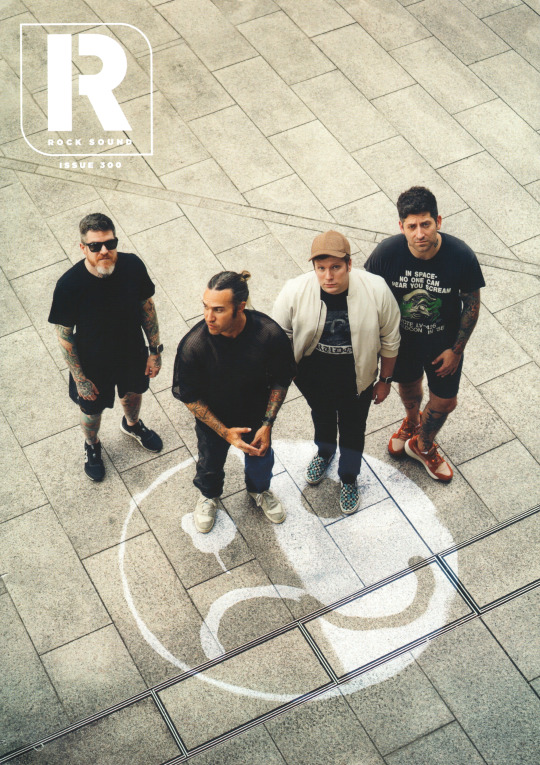


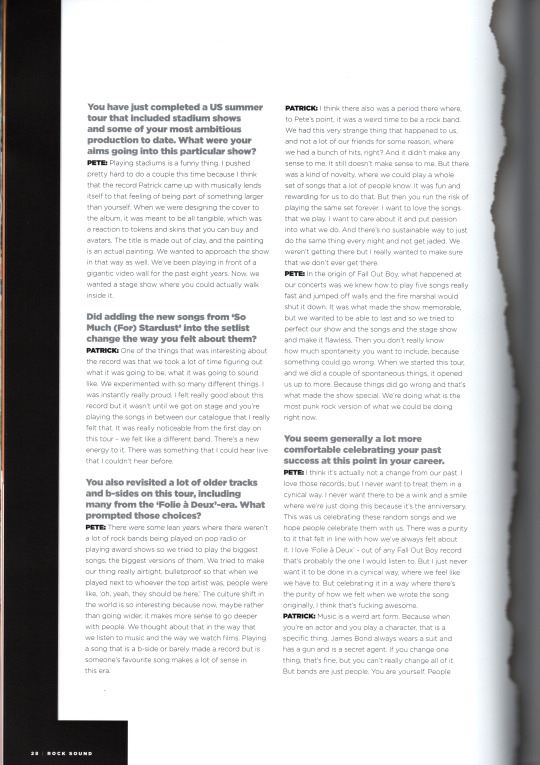



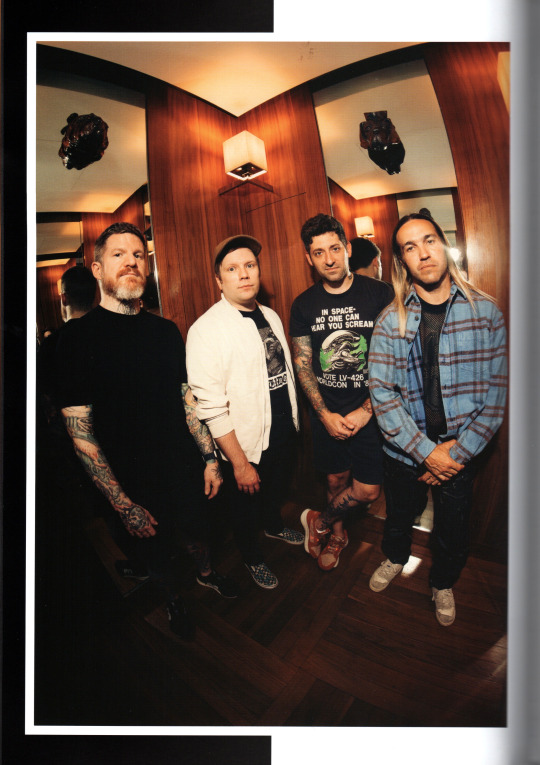
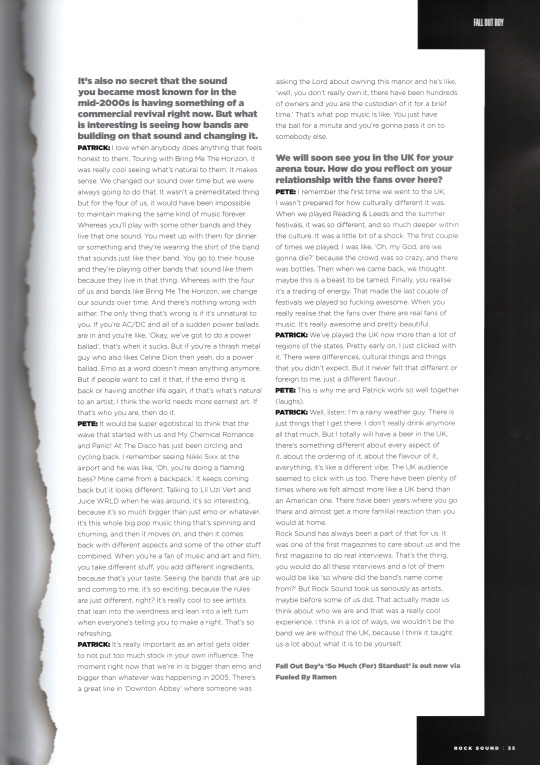
2023 september - rock sound #300 (fall out boy cover) scans
transcript below cut!
WHAT A TIME TO BE ALIVE
With the triumphant ‘So Much (For) Stardust’ capturing a whole new generation of fans, Fall Out Boy are riding high, celebrating their past while looking towards a bright future. Pete Wentz and Patrick Stump reflect on recent successes and the lessons learned from two decades of writing and performing together.
WORDS: James Wilson-Taylor PHOTOS: Elliot Ingham
You have just completed a US summer tour that included stadium shows and some of your most ambitious production to date. What were your aims going into this particular show?
PETE: Playing stadiums is a funny thing. I pushed pretty hard to do a couple this time because I think that the record Patrick came up with musically lends itself to that feeling of being part of something larger than yourself. When we were designing the cover to the album, it was meant to be all tangible, which was a reaction to tokens and skins that you can buy and avatars. The title is made out of clay, and the painting is an actual painting. We wanted to approach the show in that way as well. We’ve been playing in front of a gigantic video wall for the past eight years. Now, we wanted a stage show where you could actually walk inside it.
Did adding the new songs from ‘So Much (For) Stardust’ into the setlist change the way you felt about them?
PATRICK: One of the things that was interesting about the record was that we took a lot of time figuring out what it was going to be, what it was going to sound like. We experimented with so many different things. I was instantly really proud. I felt really good about this record but it wasn’t until we got on stage and you’re playing the songs in between our catalogue that I really felt that. It was really noticeable from the first day on this tour - we felt like a different band. There’s a new energy to it. There was something that I could hear live that I couldn’t hear before.
You also revisited a lot of older tracks and b-sides on this tour, including many from the ‘Folie à Deux’-era. What prompted those choices?
PETE: There were some lean years where there weren’t a lot of rock bands being played on pop radio or playing award shows so we tried to play the biggest songs, the biggest versions of them. We tried to make our thing really airtight, bulletproof so that when we played next to whoever the top artist was, people were like, ‘oh yeah, they should be here.’ The culture shift in the world is so interesting because now, maybe rather than going wider, it makes more sense to go deeper with people. We thought about that in the way that we listen to music and the way we watch films. Playing a song that is a b-side or barely made a record but is someone’s favourite song makes a lot of sense in this era. PATRICK: I think there also was a period there where, to Pete’s point, it was a weird time to be a rock band. We had this very strange thing that happened to us, and not a lot of our friends for some reason, where we had a bunch of hits, right? And it didn’t make any sense to me. It still doesn’t make sense to me. But there was a kind of novelty, where we could play a whole set of songs that a lot of people know. It was fun and rewarding for us to do that. But then you run the risk of playing the same set forever. I want to love the songs that we play. I want to care about it and put passion into what we do. And there’s no sustainable way to just do the same thing every night and not get jaded. We weren’t getting there but I really wanted to make sure that we don’t ever get there. PETE: In the origin of Fall Out Boy, what happened at our concerts was we knew how to play five songs really fast and jumped off walls and the fire marshal would shut it down. It was what made the show memorable, but we wanted to be able to last and so we tried to perfect our show and the songs and the stage show and make it flawless. Then you don’t really know how much spontaneity you want to include, because something could go wrong. When we started this tour, and we did a couple of spontaneous things, it opened us up to more. Because things did go wrong and that’s what made the show special. We’re doing what is the most punk rock version of what we could be doing right now.
You seem generally a lot more comfortable celebrating your past success at this point in your career.
PETE: I think it’s actually not a change from our past. I love those records, but I never want to treat them in a cynical way. I never want there to be a wink and a smile where we’re just doing this because it’s the anniversary. This was us celebrating these random songs and we hope people celebrate them with us. There was a purity to it that felt in line with how we’ve always felt about it. I love ‘Folie à Deux’ - out of any Fall Out Boy record that’s probably the one I would listen to. But I just never want it to be done in a cynical way, where we feel like we have to. But celebrating it in a way where there’s the purity of how we felt when we wrote the song originally, I think that’s fucking awesome. PATRICK: Music is a weird art form. Because when you’re an actor and you play a character, that is a specific thing. James Bond always wears a suit and has a gun and is a secret agent. If you change one thing, that’s fine, but you can’t really change all of it. But bands are just people. You are yourself. People get attached to it like it’s a story but it’s not. That was always something that I found difficult. For the story, it’s always good to say, ‘it’s the 20th anniversary, let’s go do the 20th anniversary tour’, that’s a good story thing. But it’s not always honest. We never stopped playing a lot of the songs from ‘Take This To Your Grave’, right? So why would I need to do a 20-year anniversary and perform all the songs back to back? The only reason would be because it would probably sell a lot of tickets and I don’t really ever want to be motivated by that, frankly. One of the things that’s been amazing is that now as the band has been around for a while, we have different layers of audience. I love ‘Folie à Deux’, I do. I love that record. But I had a really personally negative experience of touring on it. So that’s what I think of when I think of that record initially. It had to be brought back to me for me to appreciate it, for me to go, ‘oh, this record is really great. I should be happy with this. I should want to play this.’ So that’s why we got into a lot of the b-sides because we realised that our perspectives on a lot of these songs were based in our feelings and experiences from when we were making them. But you can find new experiences if you play those songs. You can make new memories with them.
You alluded there to the 20th anniversary of ‘Take This To Your Grave’. Obviously you have changed and developed as a band hugely since then. But is there anything you can point to about making that debut record that has remained a part of your process since then?
PETE: We have a language, the band, and it’s definitely a language of cinema and film. That’s maintained through time. We had very disparate music tastes and influences but I think film was a place we really aligned. You could have a deep discussion because none of us were filmmakers. You could say which part was good and which part sucked and not hurt anybody’s feelings, because you weren’t going out to make a film the next day. Whereas with music, I think if we’d only had that to talk about, we would have turned out a different band. PATRICK: ‘Take This To Your Grave’, even though it’s absolutely our first record, there’s an element of it that’s still a work in progress. It is still a band figuring itself out. Andy wasn’t even officially in the band for half of the recording, right? I wasn’t even officially the guitar player for half of the recording. We were still bumbling through it. There was something that popped up a couple times throughout that record where you got these little inklings of who the band really was. We really explored that on ‘From Under The Cork Tree’. So when we talk about what has remained the same… I didn’t want to be a singer, I didn’t know anything about singing, I wasn’t planning on that. I didn’t even plan to really be in this band for that long because Pete had a real band that really toured so I thought this was gonna be a side project. So there’s always been this element within the band where I don’t put too many expectations on things and then Pete has this really big ambition, creatively. There’s this great interplay between the two of us where I’m kind of oblivious, and I don’t know when I’m putting out a big idea and Pete has this amazing vision to find what goes where. There’s something really magical about that because I never could have done a band like this without it. We needed everybody, we needed all four of us. And I think that’s the thing that hasn’t changed - the four of us just being ourselves and trying to figure things out. Listening back to ‘Folie’ or ‘Infinity On High’ or ‘American Beauty’, I’m always amazed at how much better they are than I remember. I listened to ‘MANIA’ the other day, and I have a lot of misgivings about that record, a lot of things I’m frustrated about. But then I’m listening to it and I’m like ‘this is pretty good.’ There’s a lot of good things in there. I don’t know why, it’s kind of like you can’t see those things. It’s kind of amazing to have Pete be able to see those things. And likewise, sometimes Pete has no idea when he writes something brilliant, as a lyricist, and I have to go, ‘No, I’m gonna keep that one, I’m gonna use that.’
On ‘So Much (For) Stardust’, you teamed up with producer Neal Avron again for the first time since 2008. Given how much time has passed, did it take a minute to reestablish that connection or did you pick up where you left off?
PATRICK: It really didn’t feel like any time had passed between us and Neal. It was pretty seamless in terms of working with him. But then there was also the weird aspect where the last time we worked with him was kind of contentious. Interpersonally, the four of us were kind of fighting with each other… as much as we do anyway. We say that and then that myth gets built bigger than it was. We were always pretty cool with each other. It’s just that the least cool was making ‘Folie’. So then getting into it again for this record, it was like no time has passed as people but the four of us got on better so we had more to bring to Neal. PETE: It’s a little bit like when you return to your parents’ house for a holiday break when you’re in college. It’s the same house but now I can drink with my parents. We’d grown up and the first times we worked with Neal, he had to do so much more boy scout leadership, ‘you guys are all gonna be okay, we’re gonna do this activity to earn this badge so you guys don’t fucking murder each other.’ This time, we probably got a different version of Neal that was even more creative, because he had to do less psychotherapy. He went deep too. Sometimes when you’re in a session with somebody, and they’re like, ‘what are we singing about?’, I’ll just be like, ‘stuff’. He was not cool with ‘stuff’. I would get up and go into the bathroom outside the studio and look in the mirror, and think ‘what is it about? How deep are we gonna go?’ That’s a little but scarier to ask yourself. If last time Neal was like a boy scout leader, this time, it was more like a Sherpa. He was helping us get to the summit.
The title track of the album also finds you in a very reflective mood, even bringing back lyrics from ‘Love From The Other Side’. How would you describe the meaning behind that title and the song itself?
PETE: The record title has a couple of different meanings, I guess. The biggest one to me is that we basically all are former stars. That’s what we’re made of, those pieces of carbon. It still feels like the world’s gonna blow and it’s all moving too fast and the wrong things are moving too slow. That track in particular looks back at where you sometimes wish things had gone differently. But this is more from the perspective of when you’re watching a space movie, and they’re too far away and they can’t quite make it back. It doesn’t matter what they do and at some point, the astronaut accepts that. But they’re close enough that you can see the look on their face. I feel like there’s moments like that in the title track. I wish some things were different. But, as an adult going through this, you are too far away from the tether, and you’re just floating into space. It is sad and lonely but in some ways, it’s kind of freeing, because there’s other aspects of our world and my life that I love and that I want to keep shaping and changing. PATRICK: I’ll open up Pete’s lyrics and I just start hearing things. It almost feels effortless in a lot of ways. I just read his lyrics and something starts happening in my head. The first line, ‘I’m in a winter mood, dreaming of spring now’, instantly the piano started to form to me. That was a song that I came close to not sending to the band. When I make demos, I’ll usually wait until I have five or six to send to everybody. I didn’t know if anyone was gonna like this. It’s too moody or it’s not very us. But it was pretty unanimous. Everyone liked that one. I knew this had to end the record. It took on a different life in the context of the whole album. Then on the bridge section, I knew it was going to be the lyrics from ‘Love From The Other Side’. It’s got to come back here. It’s the bookends, but I also love lyrically what it does, you know, ‘in another life, you were my babe’, going back to that kind of regret, which feels different in ‘Love From The Other Side’ than it does here. When the whole song came together, it was the statement of the record.
Aside from the album, you have released a few more recent tracks that have opened you up to a whole new audience, most notably the collaboration with Taylor Swift on ‘Electric Touch’.
PETE: Taylor is the only artist that I’ve met or interacted with in recent times who creates exactly the art of who she is, but does it on such a mass level. So that’s breathtaking to watch from the sidelines. The way fans traded friendship bracelets, I don’t know what the beginning of it was, but you felt that everywhere. We felt that, I saw that in the crowd on our tour. I don’t know Taylor well, but I think she’s doing exactly what she wants and creating exactly the art that she wants to create. And doing that, on such a level, is really awe-inspiring to watch. It makes you want to make the biggest, weirdest version of our thing and put that out there.
Then there was the cover of Billy Joel’s ‘We Didn’t Start The Fire’, which has had some big chart success for you. That must have taken you slightly by surprise.
PATRICK: It’s pretty unexpected. Pete and I were going back and forth about songs we should cover and that was an idea that I had. This is so silly but there was a song a bunch of years ago I had written called ‘Dark Horse’ and then there was a Katy Perry song called ‘Dark Horse’ and I was like, ‘damn it’, you know, I missed the boat on that one. So I thought if we don’t do this cover, somebody else is gonna do it. Let’s just get in the studio and just do it. We spent way more time on those lyrics than you would think because we really wanted to get a specific feel. It was really fun and kind of loose, we just came together in Neal’s house and recorded it in a day. PETE: There’s irreverence to it. I thought the coolest thing was when Billy Joel got asked about it, and he was like, ‘I’m not updating it, that’s fine, go for it.’ I hope if somebody ever chose to update one of ours, we’d be like that. Let them do their thing, they’ll have that version. I thought that was so fucking cool.
It’s also no secret that the sound you became most known for in the mid-2000s is having something of a commercial revival right now. But what is interesting is seeing how bands are building on that sound and changing it.
PATRICK: I love when anybody does anything that feels honest to them. Touring with Bring Me The Horizon, it was really cool seeing what’s natural to them. It makes sense. We changed our sound over time but we were always going to do that. It wasn’t a premeditated thing but for the four of us, it would have been impossible to maintain making the same kind of music forever. Whereas you’ll play with some other bands and they live that one sound. You meet up with them for dinner or something and they’re wearing the shirt of the band that sounds just like their band. You go to their house and they’re playing other bands that sound like them because they live in that thing. Whereas with the four of us and bands like Bring Me The Horizon, we change our sounds over time. And there’s nothing wrong with either. The only thing that’s wrong is if it’s unnatural to you. If you’re AC/DC and all of a sudden power ballads are in and you’re like, ‘Okay, we’ve got to do a power ballad’, that’s when it sucks. But if you’re a thrash metal guy who likes Celine Dion then yeah, do a power ballad. Emo as a word doesn’t mean anything anymore. But if people want to call it that, if the emo thing is back or having another life again, if that’s what’s natural to an artist, I think the world needs more earnest art. If that’s who you are, then do it. PETE: It would be super egotistical to think that the wave that started with us and My Chemical Romance and Panic! At The Disco has just been circling and cycling back. I remember seeing Nikki Sixx at the airport and he was like, ‘Oh, you’re doing a flaming bass? Mine came from a backpack.’ It keeps coming back but it looks different. Talking to Lil Uzi Vert and Juice WRLD when he was around, it’s so interesting, because it’s so much bigger than just emo or whatever. It’s this whole big pop music thing that’s spinning and churning, and then it moves on, and then it comes back with different aspects and some of the other stuff combined. When you’re a fan of music and art and film, you take different stuff, you add different ingredients, because that’s your taste. Seeing the bands that are up and coming to me, it’s so exciting, because the rules are just different, right? It’s really cool to see artists that lean into the weirdness and lean into a left turn when everyone’s telling you to make a right. That’s so refreshing. PATRICK: It’s really important as an artist gets older to not put too much stock in your own influence. The moment right now that we’re in is bigger than emo and bigger than whatever was happening in 2005. There’s a great line in ‘Downton Abbey’ where someone was asking the Lord about owning this manor and he’s like, ‘well, you don’t really own it, there have been hundreds of owners and you are the custodian of it for a brief time.’ That’s what pop music is like. You just have the ball for a minute and you’re gonna pass it on to somebody else.
We will soon see you in the UK for your arena tour. How do you reflect on your relationship with the fans over here?
PETE: I remember the first time we went to the UK, I wasn’t prepared for how culturally different it was. When we played Reading & Leeds and the summer festivals, it was so different, and so much deeper within the culture. It was a little bit of a shock. The first couple of times we played, I was like, ‘Oh, my God, are we gonna die?’ because the crowd was so crazy, and there was bottles. Then when we came back, we thought maybe this is a beast to be tamed. Finally, you realise it’s a trading of energy. That made the last couple of festivals we played so fucking awesome. When you really realise that the fans over there are real fans of music. It’s really awesome and pretty beautiful. PATRICK: We’ve played the UK now more than a lot of regions of the states. Pretty early on, I just clicked with it. There were differences, cultural things and things that you didn’t expect. But it never felt that different or foreign to me, just a different flavour… PETE: This is why me and Patrick work so well together (laughs). PATRICK: Well, listen; I’m a rainy weather guy. There is just things that I get there. I don’t really drink anymore all that much. But I totally will have a beer in the UK, there’s something different about every aspect of it, about the ordering of it, about the flavour of it, everything, it’s like a different vibe. The UK audience seemed to click with us too. There have been plenty of times where we felt almost more like a UK band than an American one. There have been years where you go there and almost get a more familial reaction than you would at home. Rock Sound has always been a part of that for us. It was one of the first magazines to care about us and the first magazine to do real interviews. That’s the thing, you would do all these interviews and a lot of them would be like ‘so where did the band’s name come from?’ But Rock Sound took us seriously as artists, maybe before some of us did. That actually made us think about who we are and that was a really cool experience. I think in a lot of ways, we wouldn’t be the band we are without the UK, because I think it taught us a lot about what it is to be yourself.
Fall Out Boy’s ‘So Much (For) Stardust’ is out now via Fueled By Ramen.
#the cover is so funny. like theyre cute but that is genuinely bug angle. that is bugs under a rock angle. THEYRE ALREADY SHORT KINGS#fall out boy#pete wentz#patrick stump#andy hurley#joe trohman#time capsule#read the charts#ANYWAY GO HERE. GO READ HERE. BECAUSE I SPENT A LONG TIME TRANSCRIBING EVEN THO TRNASNCRIBING SUCKKSSS#i looped the spell soundtrack like 5 times and got jusmpscared by track9 every time. and then i put on smfs<3#patrick's comments about the mythologising of fob lore is so interesting#listen baby i know ur fed up and it's not ur fault but u have to understand. the story of ur band is on some genuine fanfic ass other level#the way they talk about neal avron is sooo funny#imagine being producer for this young band. and theyre brilliant but theyre also twentysomethings(derogatory)#also the way pete talks abt swift. lol. also why does he answer the q when patrick was the one in the studio lol???#ALSO also. pete being afraid of british ppl (valid and true)#and patrick pretty much taking to the uk like a duck to water (also valid and tru) is sooo funny#i rlly liked this interview i wiiiiish i got the bundle w the photobook and whatever but i was way too late :(((((((((
135 notes
·
View notes
Text
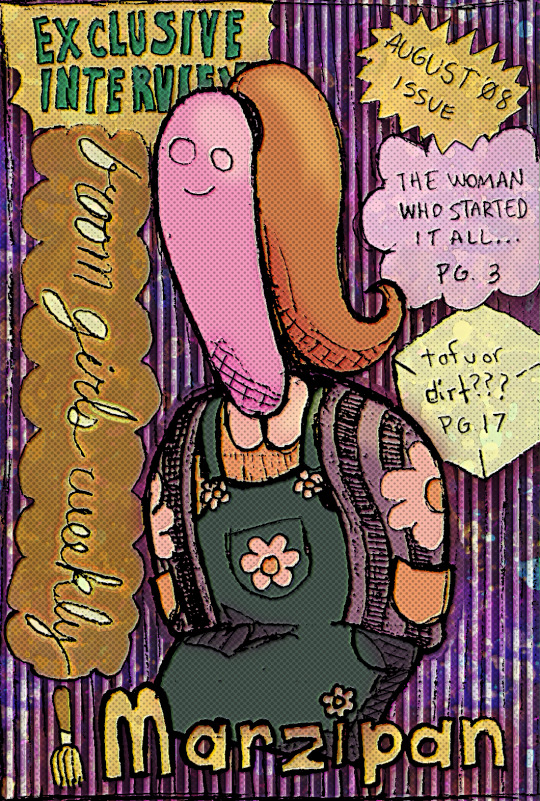
hot off the presses!
#cool swag art#homestar runner#marzipan#love her so much. colored version of a doodle i posted in the server earlier ❤️#directors commentary: notice the mag is called broom girls 'weekly' and yet it's a monthly issue#the reason the tofu or dirt story is 17 pages in is because marzis interview is 15 pages long 8pt font. she had a lot to say#also. i made this cuz if homestar and strong bad got to be on magazine covers i think she should have been on one too. feminism
209 notes
·
View notes
Text
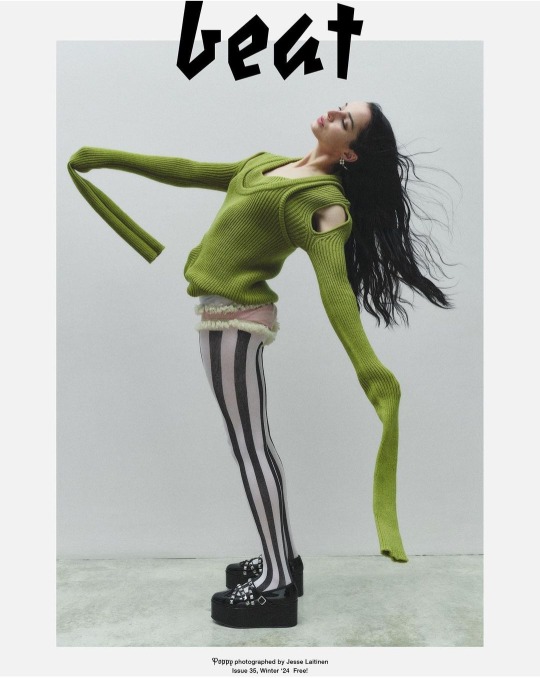

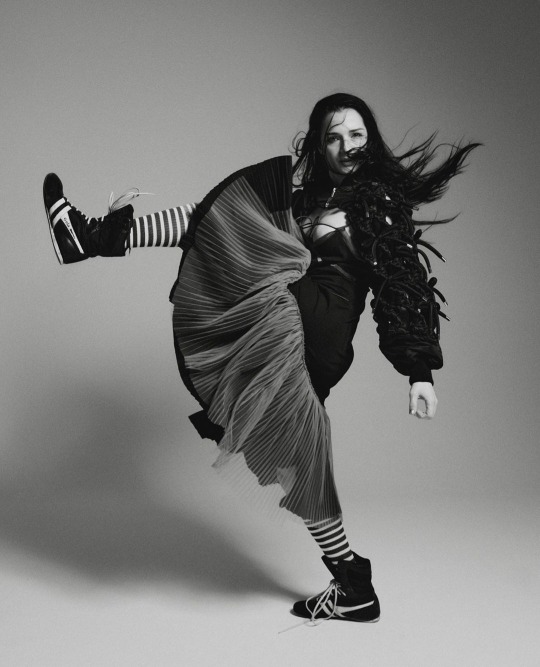
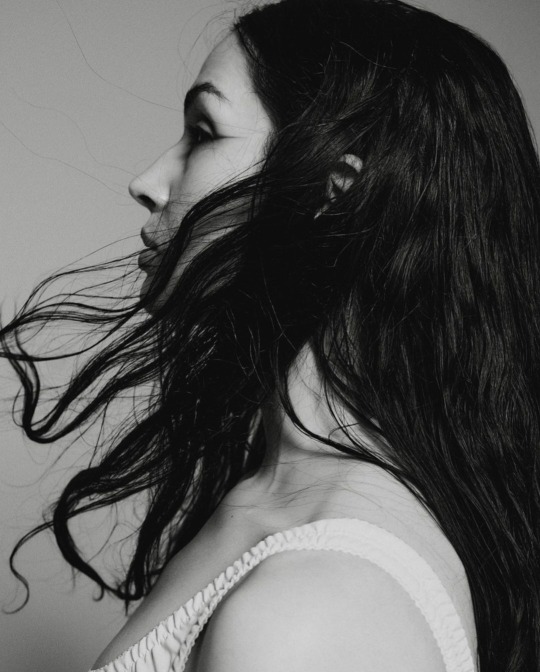
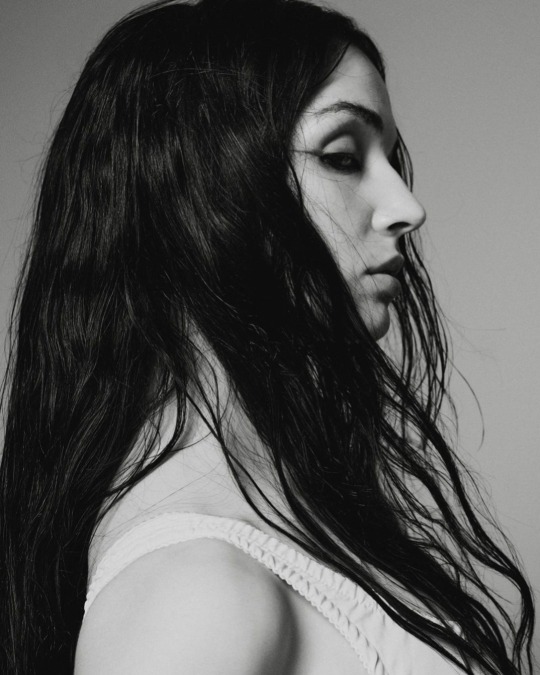

Poppy's cover story for Beat Magazine, Issue 35, Winter 2024. Photographed by Jesse Laitinen, interviewed by Owen Myers.
Get yours here
#poppy#cult of poppy#queen#poppy's world#i'm poppy#cute#fashion#interview#cover#cover story#thebeatjuice#photography#beat magazine#uk#issue 35#winter 2024
64 notes
·
View notes
Note
What's the backstory behind those cool OCs?
Thank you so much for asking about them! There's quite a bit of backstory to them, but I'd love to try and paint a decent picture, especially for Kultober. Mérie and Luc are my original characters from a ttrpg called Kult: Divinity Lost. Their story spans over 30 years, so there is what was and what is.
CW: violence, blood and injury, mentions of suicide, cults, death
30 years ago, Mérie was an undergraduate when she met Luc. They found instant companionship within one another, intrigued by each other's ideas on the strange, the grotesque, the taboo, and the undercurrent of those themes within art. What defined and defied the boundaries of *art*. How the evocative power contained within such works, extends beyond the lifetime of the artist, bringing the creator triumph over death, through visceral reaction of the viewer. They found them fascinating concepts in their youth, when loss was still a distant, faceless motif.
They fell in love, romantically and intellectually, and eventually eloped. They had a saying between one another, their own form of ‘I love you’. Je respire pour toi = I breathe for you. The lungs a symbol of their love, instead of the heart. Animus: the soul, the intelligence, the inner self in touch with the unconscious, rooted from the word anima, “to breathe”. This is what it meant to breathe for one another. It was to share the deepest parts of their being with each other, through conversation, through passion, through dilemma. They could always listen to the other breath, watch the rise and fall of their chest, and find themselves in tune with the motion.
They moved in with each other as Mérie continued into her graduate program. She decided to base her thesis off of the late Gui Vacquelin, an artist known for his progressively darker and nihilistic works -- his final pieces, a triptych, being completed only moments before he violently gouged his own eyes out with the brush, effectively taking his own life. Mérie was fascinated with the concepts he applied into his work and the effective immortality he granted himself in history through his final act.
Luc was involved with a peculiar group of individuals, which he eventually introduced Mérie into. They were eccentric, lavish, hedonistic, and debaucherous. This society could pluck the strings only the wealthiest had hands for. They shared the common interest in the dark and disturbed, and often hosted opulent, yet secretive parties centered around such themes, with exclusive access to rare collections and performances for the eve. And there was apparently a deeper layer to unpeel, more powerful secrets. Mérie was allowed on the fringes of this odd group and in time, managed to prove herself of similar enough ilk that she was invited to be initiated as a full member of the society. And as a highlight, Gui Vacquelin’s famed final triptych was to be the evening's display.
Mérie was ecstatic at the prospect, the access to the works, the connections, the secrets. It was thrilling to be in the presence of the works, to see them in the flesh. Her initiation would involve receiving a dagger, having it choose her. The excitement of the evening quickly turned to horror, as Mérie and Luc were descended upon by the members of the society, revealed in actuality to be a cult. A multitude of familiar faces turned cruel. The initiation was a ruse for a ritual to Togarini, the god of dark art. In truth, Vacquelin had been a servant of the wretched god, his paintings being used as conduits to summon Togarini. The pair were torn from one another, subjected to witness as the cult attempted to transform Mérie into a herald of Togarini.
What followed would only be stored in fragments within Mérie’s mind, a series of sounds and images in a broken frame rate. She would remember pain, flashes of her own carnage, the secrets of her flesh exposed, the distant sound of screams. But due to unknown circumstances, the ritual “didn’t take” onto Mérie. The cult instead turned upon Luc, to perfect him where she had failed. The sound of his voice breaking broke her as she tried to drag herself to where he was.
In the blink of a moment, all was silent. Time was no longer in fragments. Mérie was standing in the middle of a street, alone in the cool night air, holding onto a dagger. She was utterly disheveled – clothes torn, hair drenched, every muscle aching, covered in dirt and blood and … without any apparent wounds on her body. Luc was nowhere to be seen. Blade in hand, she considered the worst. Something terrible. Something… unspeakable. She would never….hurt him? Confused, terrified, obviously in shock, she returned to their flat to try and gather herself. Returning home was no refuge from the horror. He wasn’t there. But neither were any fragments of him. Any notion of his former presence only formed an absence. Papers were missing, clothing, cigarettes, even coffee mugs. Empty spaces on the walls where pictures should be. Money had not been touched, nothing stolen. None of Mérie’s belongings had been tampered with, though she noted a weight lifted from her left finger. Nothing legally binding could be located and all her identifications were painted with the shadow of her maiden name. Luc wasn’t just missing, he had been erased from the world as a whole.
She would not see any members of the society again. Friends would never question about Luc. Therapy would declare that Mérie had suffered an episode of stress induced psychosis, due to some trauma her mind had chosen to block and that she had created the figment of a man as some representation of comfort and potentially betrayal. She refused to believe the packaged explanation and feigned acceptance, choosing to pick up the fragments left of her former life, and continue on with her life, always holding her breath that some true answers would arrive. Time continued to pass. A month, a year, five, twenty five years. Eventually, she untensed and allowed the past to be a dream. Save for the dagger which she kept, close and secret. It was real and by some sense, made Luc real, though time made it more and more difficult to hold his appearance in her mind, a ghost that would haunt only her.
Until the events of an evening nearly thirty years later. Mérie was working as a curator for the Cecil Thorne Art Centre. Wealthy patrons had chosen to put together a charity event in the form of a midnight showing titled, The Atrocity Exhibition, which for the first time would bring together the complete collection of Gui Vacquelin’s works. Apprehension? Terror? Anger? It would be difficult to describe what Mérie felt when her director announced the project, but she was in no position to express these notions. However, the evening descended into even worse than what she had feared. The museum became a literal hell and Mérie would find herself lost within some of the deepest reaches of that.
But amidst it all, through chaos and fog and fire, a hand grabbed her and ripped Mérie forward through a war torn hellscape. The hand, the figure, the face. All that of Luc. Though his hair and beard had grown long, no age had touched his visage as time has brought to her own, She considered the possibility that she was dead to the world, if he was there. The chemical bursts of death come to bring penance or consequence. She allowed her composure to crack. After years of confusion, years of longing, years of surviving alone, she rushed to his arms, to his lips once they stopped running, in desperation to ground herself to them moment, to feel some sense of warmth, to solidify his existence after so long. As the glow of the reunion waned she recognizes two things: that she was still alive and that this man was not her husband, but an imposter, wearing his skin, twisting her with his voice, employing the couple’s phrase as they shared a cigarette. To what end? How would he know…? An event came to expose this truth, leaving Mérie with a choice: confrontation or continuation of the illusion. A tense pause exchanged between their eyes… and she decided to choose the latter.
Because the option was somehow less painful. Because she spent so long not even knowing if this person existed at all. That this man still represented some proof, trickery aside. And to give it all up again so soon? To deny herself what she had ached for? Rebuild stone walls that had only just crumbled? If this reflektor was to destroy her, kill her… she resigned herself to the idea. If it’s him, his face, perhaps there would be closure. Comfort in the end of this sorry story. Yet she overlooked that the price didn’t have to be her life. It ends up being other people’s lives that are the toll for the imposter’s freedom. People she had a duty to protect. And she carries that loss moving forward. Knowing she brought this weapon into a space that was supposed to be safe because she let herself want too much. And that “it took”. She builds her walls higher than ever after the events. And yet and YET, if he returned to her again... she's not all sure she wouldn't crumble all over again. She wants to refuse that opportunity should it come.
Through the toil of erecting composure, she will stare at the ceiling every night and sees a familiar face, turned cruel. In her dreams, she sees the full events of what actually occurred the night she lost Luc. And again and again and again, she has to watch as she kills him. It’s the only way to wake up. Bitterness replaces yearning. Defensiveness replaces trust. Paranoia closes around her throat. Even the memory of him bastardized by the swing between the charade and the truth.
What's to come of their story? That's for my DM to decide in our next campaign....
Lokorum’s piece is a representation of Mérie’s loss. Consistently revisiting the space where she last knew him. He’s been gone now for more years than she was alive when she met him. Half her life, defined by before the loss. Another half defined by its aftermath. She’ll come back here again and again trying to piece together what happened. Until she finally learns the truth and can never leave. If only she could forget after one last dance…
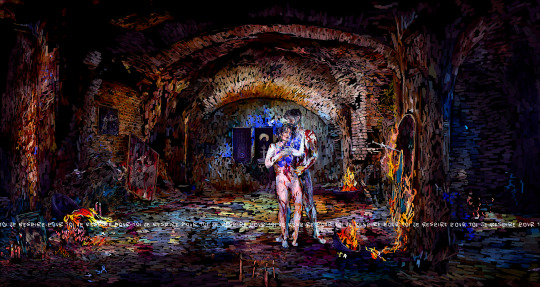
Ptr-sqloint’s piece is a representation of the weight of shame that Mérie carries. The mirror offers back a reflection of a reflection. She is confined in its frame. The imposter, a reflection of Mérie’s desires, vices, weakness. He exposes them, points them out, makes her bare witness to them, the secrets that are not physical, twisting love into a vice. What is it that she breathes for? Be honest now, Mérie.

#my ocs#mérie#luc#the imposter#kultober#kult rpg#role playing#thanks for the ask!#sorry that the answer is 1800 words!#i rotate these guys in my head daily#at centrifuge speed#and yes there are disco elysium references in the lungs as well as Mérie and Luc's last name: Vicquemare#though their personalities and dispositions are quite different from the source material reference#lungs are for love#lokorum#ptr-sqloint#i plan to release an interview style story of Mérie recounting the events of her past and the Atrocity Exhibition campaign#I've gotten Part One written out which covers the fragmented memories of the past#And am looking forward to writing Part Two covering the events of the Campaign and the imposter...
23 notes
·
View notes
Text
really thinking about how Dick pulled off his acting abilities to their 110% to fake being different lovers for kory for the sake of maintaining his secret identity and relationship with her, like its hilarious, do you think kory have a picture book of all her lovers (dick) and showed them to his sibs and they use it as ammo lmao
#Batman when he realized someone has to go deep undercover for spyra: i know exactly who to call.#Hey dick remember that one time you were ginger?#Dick Grayson how did you feel when you found out Kory’s former lover (?) is The Nightwing himself?#Do you feel the pressure of not being in the superhero community? Does that give upur relationship with Supermodel Kory a disadvantage? 🎤����#And then someone tap these next 20 seconds of Dick bullshitting his way out of these interviews#Like he got the cover story and is a professional yes#but the fact he wanted to be with her so bad he got himself tangled like that is so funny to me lmao#dick grayson#kory anders#Or even kory being asked about her relationship with them lmao “what broke you up it was a very brief relationship”#and kory can’t say its because dick grew allergic to that specific hire glue they had back then: his hair was bad…#koriand'r#Titans
24 notes
·
View notes
Text
Stephen Ambrose count your days
#the joe toye interview and he skips huge chunks of the story😭#like what the helll#he barely covers normandy and the he goes#you lost your leg in Bastogne right?#and Joe goes: yes#and Ambrose goes: alright So what’s the deal with your youngest son#😀
13 notes
·
View notes
Text


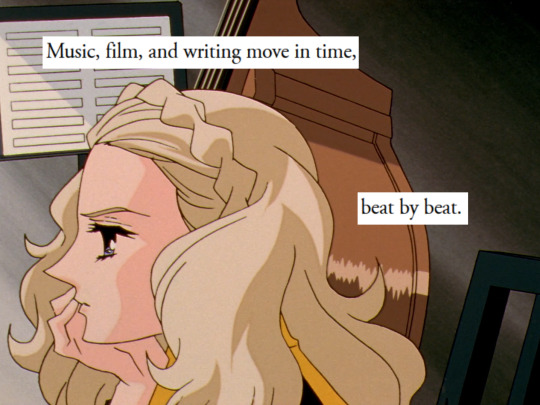
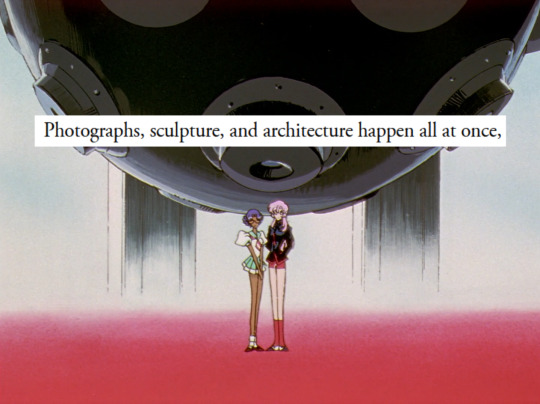
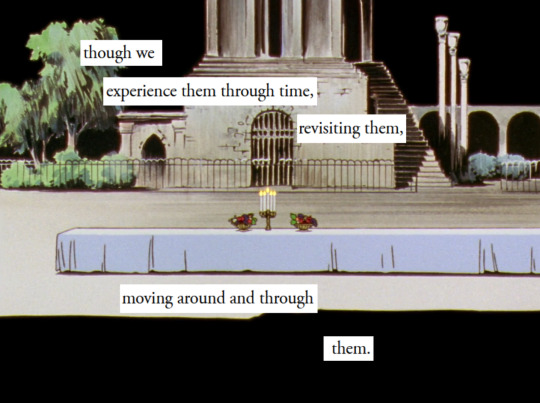



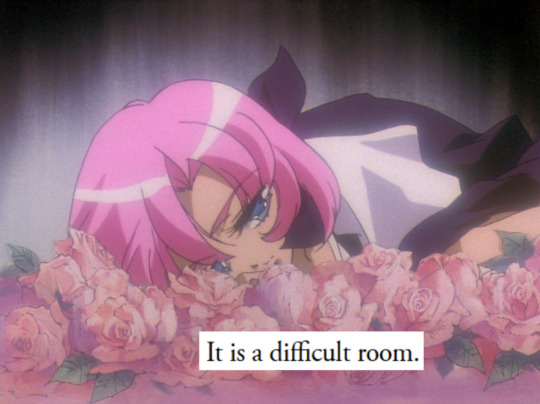
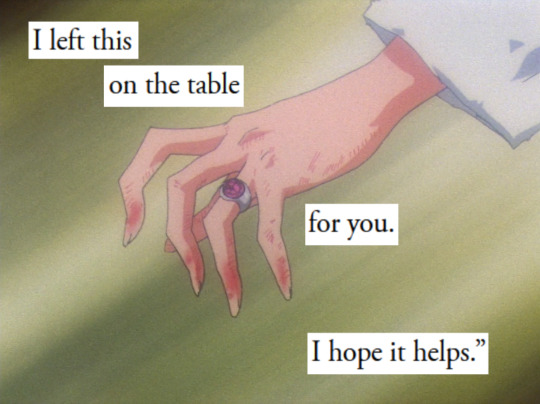
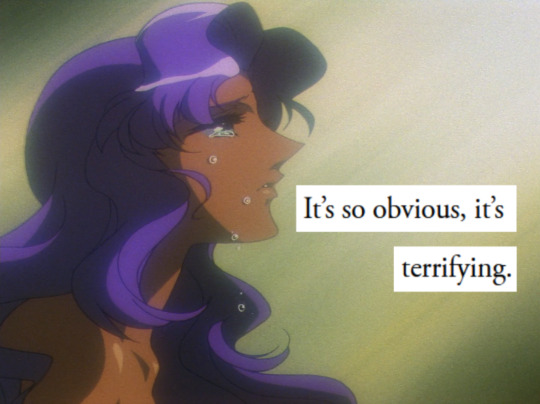
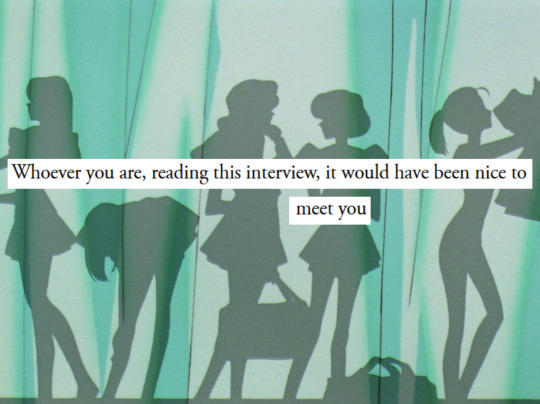


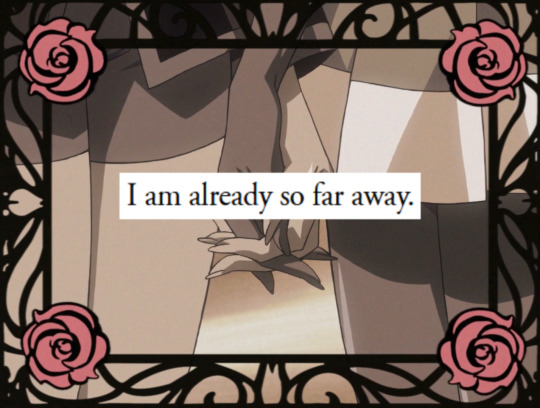
[ID: fifteen shots from 'revolutionary girl utena' with black text on a white background edited over them. the first is of utena sitting in the planetarium, which is subsumed in darkness. behind her is the coffin she hid in as a child. text reads: 'time is so central that i forget about it.'
the second is of miki handing kozue the letter from their mother. text reads: 'i like postcards because they move through time and space.'
the third is of nanami sitting pensively in front of a cello and music stand. text reads: 'music, film, and writing move in time, beat by beat.'
the fourth is of utena and anthy standing beneath the projector, posing for a photo. text reads: 'photographs, sculptures, and architecture happen all at once,'
the fifth is of a dining table in front of nemuro memorial hall. the white tablecloth endlessly extends off the right side of the frame. text reads: 'though we experience them through time, revisiting them, moving arund and through them.'
the sixth is a close-up of the fourth shot. text reads: 'we document to share with the future.'
the seventh is of akio's dining table standing empty, whilst a red rose spins in the top right corner. text reads: 'we benefit from all the previous documents.'
the eighth is of utena prying open anthy's coffin, crying out to her. text reads: 'we say, "i was in this room once.'
the ninth is of baby utena curled up on a bed of roses, her eyes barely open and expression somber. text reads: 'it is a difficult room.'
the tenth is of utena's bloody hand reaching desperately out to anthy. text reads: 'i left this on the table for you. i hope it helps."'
the eleventh is of anthy staring up at utena, weeping freely. text reads: 'it's so obvious it's terrifying.'
the twelfth is a row of girls' shadows, changing behind a curtain. text reads: 'whoever you are, reading this interview, it would have been nice to meet you'
the thirteenth is of anthy standing in her pink outfit at the gates of ohtori, looking back at the tower. text reads: 'but i couldn't wait,'
the fourteenth is of a framed picture of utena and anthy. akio has been cropped out. there is a pink rose frame around the shot. text reads: 'i had to move on,'
the fifteenth is a close-up of the same photo with the same pink rose frame. utena and anthy are tentatively holding hands. text reads: 'i am already so far away.' /end ID]
richard siken, excerpt from the need for making / revolutionary girl utena (1997)
#been in the drafts for a couple of weeks but im sikenposting baby!!!!! go read cover story stat!!!!!!!#this quote is one of my all time faves from an interview about an all time fave book#like girl. i was in this room once it is a difficult room i left this on the table for you i hope it helps#it would have been nice to meet you but i couldnt wait i had to move on i am already so far away. IF YOU EVEN CARE!!!!!!!#honestly just go read that whole interview it does things to me. think about it always always always#revolutionary girl utena#rgu#web weaving#shut up daisy
159 notes
·
View notes
Text
I absolutely loved hearing about how the 1940's mardi gras party and massacre became this urban legend (and tourist spot) through out the town. It was cool to hear how the story has been changed and warped through the generations. And I also found it rather interesting that, even though pretty much everyone who was present in the 40's new that Louis and Lestat were together (especially after their dance and kiss), how over time that got twisted and covered up into Claudia being Louis' "child bride"
#something something about certain people covering up queer love throughout history#also I know literally next to nothing about this word and it's story so many this was a thing in the books#and maybe it was moreso Lestat warping people's minds about things#either way I really like it#interview with the vampire#iwtv
30 notes
·
View notes
Note
New Jarch celebration ask! If you were to write a modern (<-optional) AU inspired by your own life/hobby/passion/whatever activity you practice yourself, what would it be like? (This is meant to be Jean centered, but information about other characters are more than welcome too!)
fun fact about me is that i’m a marketer by trade but a journalist by training. so…
KoF newsroom au okay hear me out
jean is the managing editor of a failing newsroom. public trust in journalism is down. half her staff has left for more stable jobs in PR and marketing. her editor-in-chief is off on a sabbatical to barbatos-knows-where and keeps posting gorgeous beach pictures on his instagram story
she looks at the accounts and comes to the realization that they’re bleeding money. they’re running on a skeleton crew with no room for layoffs and she’s already slashed her print issues from 6/year to 4/year. if they don’t get subscriptions up by the end of the year they’re going to have to shutter operations
to save the newsroom she loves, jean and her motley crew of reporters are going to have to put on the biggest talent show break the biggest story this town has ever seen
meet the cast:
jean, the managing editor, is a rising star in the journalism world. she honed her reporting and investigative skills at international gigs in liyue and sumeru before returning home to pick up an editor position at the mondstadt times. she isn’t technically supposed to be in charge of the finances… or of the editorial direction… but with her editor-in-chief on sabbatical and her director of operations off to greener pastures, she kind of just does everything that needs doing. you can often find her and her red pen at the newsroom long after everyone else has gone home
amber is the newspaper’s one and only reporter on the breaking news beat. the times moved away from breaking news a few years ago to focus on more longform stories but amber has stubbornly stuck around. this beat is particularly gruelling because of how quickly news moves - you have to be on your toes all the time, filing sometimes 3-4 stories a day - but amber works tirelessly and with so much enthusiasm that jean sometimes wonders if she’s found something stronger than coffee to get her through the day
lisa is technically the features editor, but since they’re so shorthanded, she’s taken up the responsibility of working with the freelance fact-checkers as well, which jean is desperately grateful for. she doesn’t pull the long hours that jean and amber do, but she gets an incredible amount of work done in her 7-hour workdays. noelle is one of their longtime fact-checkers who’s incredibly meticulous and good at her job - she’s been gunning for a full-time position forever but jean just doesn’t have space in the budget to bring her on
albedo, the lightly mysterious science-prodigy-turned-reporter, heads up the investigative journalists. journos in general tend to be driven by curiosity (read: they love drama) but this bunch in particular loves to stick their noses in things. half their sources only offer information “not for attribution” (their quotes must remain anonymous) or “on background” (they cannot be quoted directly at all). sucrose is a relatively new addition to the team who’s been killing it (somewhat to jean’s surprise) because her inoffensive demeanour makes nervous sources more likely to want to speak with her
eula works the politics beat, which was itself a big headline when she joined the times. no one trusted a lawrence, scion of one of mondstadt’s oldest and most corrupt political dynasties, to report accurately on national politics. but eula has proved herself an invaluable addition to the newsroom - she’s earned a reputation for tough questions and hard-nosed reporting, and has gotten herself thrown out of city hall more than once for refusing to back down from a line of questioning. mika is a younger reporter on the international news beat - he doesn’t have eula’s doggedness, but his head for geopolitics is unparalleled
kaeya is in charge of the lifestyle section - he writes (or assigns) all the fun fluff pieces on celebrities, culture, fashion, food and wine, etc. despite leading the lowest-stakes section, he’s been known to bring jean massive political stories before eula or albedo even catch wind of them. jean suspects he maintains contacts from his time on the crime beat - but when she asks he always just blinks innocently at her and doesn’t respond. he’s also unofficially in charge of babysitting klee, who at the tender age of 8 is the times’s only unpaid intern (mostly because, when alice dropped her into jean’s care, it was easier to give her a title and let her hang around the newsroom than find an after-school program capable of keeping her from causing chaos)
#asked and answered#thank you SO much for the ask this was so fun to think about! man i miss journalism sometimes#disclaimer: i have never actually worked in a newsroom (only interned and freelanced)#also i’ve intentionally blurred the lines a bit between a newspaper newsroom and a magazine newsroom. for example:#it wouldn’t make sense for a newspaper to have only 1 breaking news reporter. and it wouldn’t make sense for a magazine to have one at all#also this isn’t really relevant to the knights but as a snippet of backstory#jean diluc and kaeya used to work together in a newsroom as baby journos with frederica as their assigning editor#all three worked hard news beats - jean on politics; diluc on business; kaeya on crime#but when diluc’s father died after getting in too deep with organized crime#the press covered it so poorly and salaciously that he left the industry altogether#and it drove a rift between him and kaeya because he felt that kaeya - on the crime beat - should have been able to prevent crepus’s death#kaeya stayed in the industry but moved away from hard news to something lower stakes#jean stayed in hard news but has been slowly working to change the way her newsroom reports on crime#she made everyone take workshops on trauma-informed interviewing#and has been coaching amber on how to talk to grieving family members when she’s chasing a story#long post#jean gunnhildr#knights of favonius#leifythoughts
8 notes
·
View notes
Text
GOTARD info: more of Godeonia
youtube
(Eng) More about the "Godeonia" project with fragments of rehearsal tracks in the background. More music:
https://gotard.bandcamp.com/
(Pl) Więcej o projekcie "Godeonia" z fragmentami próbnych utworów w tle.
#gotard#worldmusic#chillout#relax#Youtube#job interview#interview#old map#medieval#story#bandcamp#album cover#cover art#cover#book cover#album art#electronic music#musique#world music
11 notes
·
View notes
Text





variations of a fake magazine cover made for fun 0u0
#artists on tumblr#digital art#goober#alternative#art block#horror art#gas mask#oil pastel#edited photos#zine#fake zine cover#psychopomp fan#grunge#oh btw im being given the opportunity to write a short story in a zine soon wish me luck :]#as well as a fake interview with a strange made up person
8 notes
·
View notes
Text

Book 8 of TGCF arrived and I still can’t move on from SVSSS that I started reading as a short interlude while waiting 😭
#shen qingqiu#luo binghe#the cover art of the english version is so cute i wanna draw the#the scum villain's self saving system#mxtx#why this pose tho for the love of god idk too lol#shang qinghua might have ask them to pose for#the interview in the last special story#i forgot their height difference so imagine them both kneeling for the pose#svsss#danmei
67 notes
·
View notes